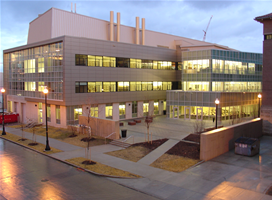Program Orientation
As a graduate student in Behavioral Neuroscience, you will study behavior from a biological perspective. Behavioral Neuroscience training will prepare you for a research-oriented career in academics or industry.
You will develop an expertise that spans the traditional field of psychobiology. This will include training in basic brain and behavioral sciences, as well as statistical and data analysis methods. Basic work will be in neuroanatomy and neurophysiology. Advanced work may be in such topics as cellular and molecular neurobiology, behavioral pharmacology, behavioral neuroendocrinology, behavioral neuroscience, sensory psychobiology, and psychoneuroimmunology
Other advanced work may be in the most current behavioral neuroscience and molecular biological techniques - methods such as immunocytochemistry, in situ hybridization, radioimmunoassay, in vivo microdialysis, HPLC, ELISA, northern and western-blot analyses, flow cytometry, RT-PCR, measurements of antibodies, small animal surgery, cellular proliferation tests, brain lesions, behavioral testing, and voltammetric techniques. Students will also develop a sophisticated foundation in research design and quantitative methods that will be highly useful in designing substantive research studies and analyzing data from such studies.
Active research participation is central to the training program. You choose a faculty advisor early and work closely with that person on projects of mutual interest. In consultation with your advisor, you are also encouraged to develop collaborative research interests with other faculty as well as with fellow students. These collaborations are a foundation from which you will build independent research programs.
The Behavioral Neuroscience program is flexible. It is organized to help you develop a course of study that fits your goals. Formal coursework varies, depending on your background and interests.
Such graduate work in Behavioral Neuroscience requires quantitative and technical expertise, and you should have a strong background in biology, neuroscience, or the biological foundations of behavior. Thus, students are encouraged to supplement their studies with courses that emphasize a biological approach to understanding behavior.
Program of Study
You will develop an individualized study program, leading to the Ph.D. degree in four to five years.
The program offers many opportunities for research completed either collaboratively or independently. In addition, activities associated with teaching or research assistantships will provide further valuable experience. Depending on your interests, the program is sufficiently flexible to prepare you for an academic career or for a research career in the private sector.
By specializing in psychobiology and behavioral neuroscience, you acquire an understanding of the fundamental principles of general experimental psychology as well as training in the methodology of behavioral neuroscience. The Behavioral Neuroscience Program is an integral part of the University-wide Neuroscience Program. This program affords you additional training opportunities in anatomy, biochemistry, pharmacology, physiology, and molecular neuroscience.
You will pursue an individualized program of study, prepared in cooperation with your faculty adviser, that gives consideration to program core requirements as well as your background, interests, and competence. During the first two years, collaborative research with your faculty advisor and coursework in Behavioral Neuroscience program generally fulfill the requirements of the M.A. degree. The specific details of the Behavioral Neuroscience graduate program are described here.
Every student is encouraged to complete at least one year of teaching experience at the undergraduate level. Typically, the preferred time to do this is the year immediately after you complete your master's degree, or the third year of study. Most students find that the teaching experience not only prepares them for positions as instructors after graduation, but also helps in preparation for the Candidacy Examination (CE). Successfully completing the CE admits you to Ph.D. candidacy. Most students complete the program after four or five years of study.
There is no further formal coursework to be taken once you pass the CE. Instead, you focus your full-time efforts on research related to the Ph.D. dissertation. Sometimes, students complete a dissertation plan during the third year of study. This is done so that a pilot project, which will determine the feasibility of the proposed dissertation, can be completed. All dissertation proposals must be approved by your thesis committee that is composed of your advisor and at least two other faculty members.
Areas of Emphasis
There are several main areas of emphasis in the Behavioral Neuroscience program, including: neuronal mechanisms mediating cognitive functions and cognitive disorders; sensory neurophysiology; recovery of function after damage to the developing and aging nervous system; neuronal and cognitive mechanisms mediating drug addiction; animal models of neuropsychiatric disorders; neuronal mechanisms of learning and memory; effects of stress on cognitive, behavioral, and endocrine processes; neurobiological mechanisms underlying the interactions between anxiety, stress and cognition; social and physiological factors underlying affect and emotion.
Facilities and Financial Support
The offices and laboratories of the program are housed in Psychology Building, located in a very attractive area of the OSU campus. The facilities of the program include a central computer laboratory. You will also have access to the university's extensive and powerful system of mainframe computers. Individual labs contain all of the equipment to conduct modern psychobiology and behavioral neuroscience research. Research laboratories include facilities for surgery, histology and histochemistry, neurochemistry, autonomic physiology, single and multi-unit recording, computerized operant systems and other automated behavioral analysis systems, in vivo microdialysis systems; brain mapping, and human neurophysiology.
Fellowships, research assistantships, and teaching associate-ships are available on a competitive basis. Special University Fellowships are reserved for minority students. The financial support provides tuition, fees, and a monthly stipend for all students throughout their tenure in the program.

